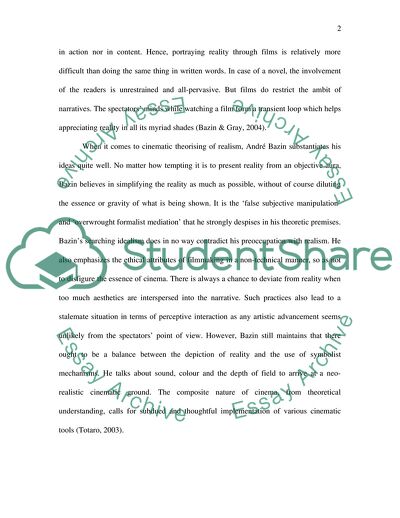
- Home
- Free Samples
- Premium Essays
- Editing Services
- Extra Tools
- Essay Writing Help
- About Us
- Studentshare
- Subjects
- Miscellaneous
- Film and critical theory 1
Film and critical theory 1 - Essay Example

- Subject: Miscellaneous
- Type: Essay
- Level: Undergraduate
- Pages: 4 (1000 words)
- Downloads: 0
- Author: samanthadeckow
Extract of sample "Film and critical theory 1"
The classical concept of filmmaking is exhaustively grounded on depicting realism through usage of a broad variety of tools such as mimesis, narrative, various photographic techniques, non-linear treatment of time and so on. This paper is going to critically examine classical film theories with specific reference to the works of eminent French film critic and theorist André Bazin. The essence of cinema has always been akin to the aesthetics of realism, particularly in Europe. The 20th century concepts of filmmaking have by and large espoused the impressionist stance to portray reality.
In order to achieve this, cinematic theories have laid down numerous techniques majority of which are typically based on photographic experimentations of various types. Such abstractions generally elicit subjective responses from the spectators to what can be essentially be defined as an accusative representation of the director’s vision. This dichotomy is best understood if one compares a film with a novel. A film is culminated into moving imageries on the basis of light, sound and camerawork.
To put it differently, motion pictures neither lack in action nor in content. Hence, portraying reality through films is relatively more difficult than doing the same thing in written words. In case of a novel, the involvement of the readers is unrestrained and all-pervasive. But films do restrict the ambit of narratives. The spectators’ minds while watching a film form a transient loop which helps appreciating reality in all its myriad shades (Bazin & Gray, 2004). When it comes to cinematic theorising of realism, André Bazin substantiates his ideas quite well.
No matter how tempting it is to present reality from an objective aura, Bazin believes in simplifying the reality as much as possible, without of course diluting the essence or gravity of what is being shown. It is the ‘false subjective
...Download file to see next pages Read MoreCHECK THESE SAMPLES OF Film and critical theory 1
Why the auteurist theory has become so important to film analysis
Women in film Noir
Film Theory of Bazin and Eisenstein
Critical Bibliography: Women in Film Noir
How Useful Is the Concept of the Auteur in the Context of Post-War European Cinema
Film through Marxian Critical Analysis
Film Theory and Analysis
Crime and Social Learning Theory

- TERMS & CONDITIONS
- PRIVACY POLICY
- COOKIES POLICY